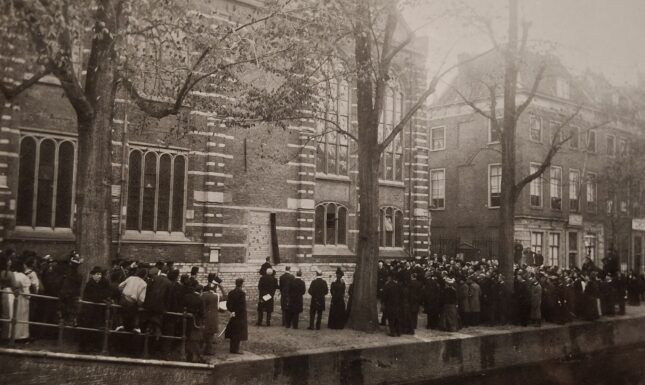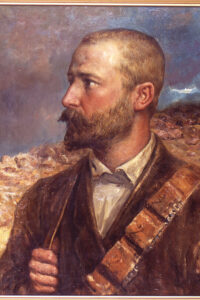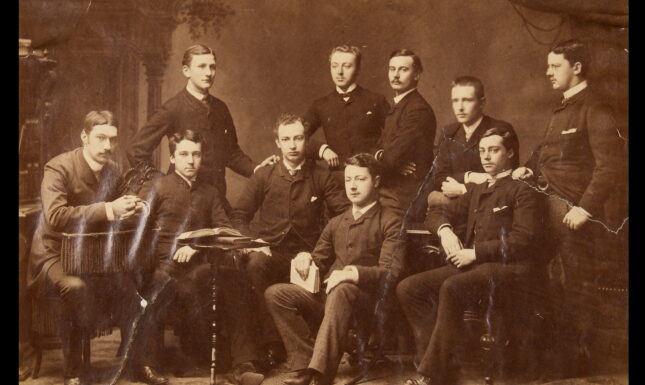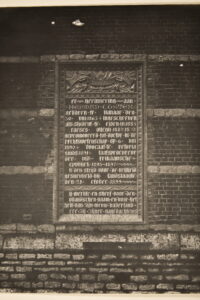Claiming Coster
On 4 November 1901, a large crowd gathered on the Rapenburg for the unveiling of a memorial, mounted on the Academy Building of Leiden University. The memorial was erected in memory of Herman Coster. Who was he and why is commemorated at this very spot, at the heart of Leiden University?


It is no longer on its original spot: in 1914 it was moved to the square of the Academy Building due to renovations. As a student, I walked past the memorial dozens of times. For a long time, I thought that the monument was erected in honour of Laurens Janszoon Coster, who was long supposed to be the inventor of the printing press. Only years later did I see that an entirely different Coster was being commemorated: Herman Jacob Coster (1865-1899). He was killed during the Battle of Elandslaagte, during the Second Boer War in which the South African Boer Republics fought for their freedom against the British Empire.
Coster was born in Alkmaar and studied law at Leiden University from 1885 onwards. During his studies he was already involved with the Boer cause and after he obtained his doctorate in law in 1890, he left for the South African Republic, one of the two Boer republics. Coster went to work as a lawyer and even served as the Republic’s state attorney for some time. When the Second Boer War started in 1899, Coster volunteered for the Boer army. He was killed in his first battle.


Coster’s death coincided with a short but intense wave of enthusiasm and sympathy for the Boers, which swept through the Netherlands around 1900. Many new streets and in some cases whole neighbourhoods (de Transvaalbuurt) were named after the heroes of the Boer Wars. In Leiden and at Leiden University, the sympathy for the Boers was largely channelled through Coster. In the collection of the Academisch Historisch Museum, a number of ‘Costeriana’ can be found, such as photographs, various in memoriams and a painting by Jan de Jonge. In 1900, A Herman Coster fund was founded, which commissioned not only the memorial, but also funded students from South Africa to study in the Netherlands. The foundation is nowadays part of the Leids Universiteits Fonds (Leiden University Fund).
Interestingly enough, quite a number of these ‘Costeriana’, including the memorial, stress Coster’s connection with Leiden University and especially the Leiden student community, whereas most of the remembrance cult surrounding the Boer War in the Netherlands focused on the African ‘brother nation’ fighting against British imperialism. Coster is remembered on the memorial as praeses of the Leidsche Studenten Corps (president of the main student association in Leiden) in 1889-1890, and in memoriams published around 1899 and 1901, highlight Coster’s student life.




This focus is partly explained by the fact that many of these texts were written by Coster’s old student friends in Leiden, most importantly Lambertus Joannes Plemp van Duiveland (1868-1940) and Gerard Vissering (1865-1937). They studied together with Coster and were also very active within the Leidsche Studenten Corps. Their memories are still strongly marked by the image they had of Coster. As Vissering would write: ‘Those who get to know the student Coster, will be able to judge the later South African citizen at full value’.
But it also worked the other way around. By focusing on the student Coster, his (heroic) role in South Africa also radiated back to Coster as a student and with him to the entire student population. Friends like Plemp van Duiveland and Vissering paint a picture of Coster as a perfect (corps) student. According to Plemp van Duiveland Coster's character was ‘a harmonious set of virtues: sincerity, courage, willpower and love for justice and freedom’. Coster died for this justice and freedom, although these values have been cast in a different light by the later role of the Boers in South Africa.
Of course, the crowd that had gathered on the Rapenburg in November 1901 commemorated Coster’s actions in the Second Boer War: ‘for honor, freedom, justice’ can be read on the memorial. However, by remembering him in such a prominent place (with a wink to the university’s motto praesidium libertatis), while focusing on Coster’s student life, he was also claimed back by Leiden University and celebrated as one of the finest examples of Leiden students.


